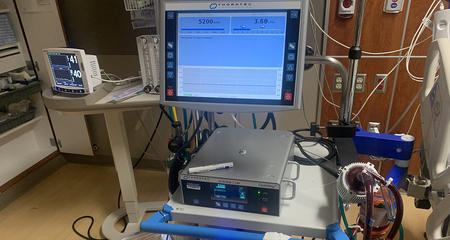Pulmonary hypertension is high blood pressure in the blood vessels of the lungs. It occurs when the small blood vessels that go through the lungs become thicker, constrict or become plugged. This, in turn, makes the right side of the heart work harder to pump blood through the lungs.
If pulmonary hypertension worsens, the heart will become enlarged and weaker, pumping blood less efficiently into the lungs and throughout the body. Patients then develop progressive fatigue and shortness of breath, two typical symptoms of pulmonary hypertension.
Pulmonary hypertension is a complex condition that can require several different treatment approaches to provide the best outcomes. This complexity makes it important that patients are evaluated at a center that specializes in pulmonary hypertension by physicians who are experts in diagnosing pulmonary hypertension and offer the full range of treatment options.
Early Diagnosis, Specialized Treatment Are Key
Since symptoms of pulmonary hypertension can be caused by other heart and lung conditions, it is important for patients to be correctly diagnosed as early as possible. Pulmonary hypertension is usually a chronic condition that can be difficult to treat. Fortunately, recent discoveries and continued research are giving specialists the tools to treat the condition more effectively, helping patients feel better and improving the quality of their lives. As a result, primary care physicians are looking for this disease sooner in patients and referring patients for specialized care in more timely ways.
Symptoms of Pulmonary Hypertension
Early in the disease, symptoms may be nonspecific and can mimic symptoms of other medical conditions. It is also possible that patients may experience only limited symptoms. Symptoms typically associated with pulmonary hypertension include:
- Progressive shortness of breath (also called dyspnea)
- Fatigue or tiredness in association to shortness of breath
- Chest pain or pressure that typically occurs during activity (angina)
- Dizzy spells that typically occur during activity or exercise
- Fainting
- Leg swelling (edema)
- Rapid pulse rate (tachycardia)
- Heart throbbing (palpitations)
There are more than 20 known causes of pulmonary hypertension, which can affect people of any age, race and ethnic background. It is more common in women than in men.
Pulmonary Hypertension Condition Groups
Pulmonary hypertension experts divide the condition into five groups of conditions based on the many causes of this complicated disease. It is important that patients are diagnosed and treated by physicians who are experts in all components of the disease and can provide a full range of treatment options.
As the largest academic pulmonary hypertension program in the state, we offer patients comprehensive care plus access to physician specialists in the related conditions that cause pulmonary hypertension. Our program has the expertise, experience and resources to treat all patient needs for pulmonary hypertension, as well as these related conditions.
Group 1: Pulmonary Arterial Hypertension (PAH) Conditions
Group 1 conditions are those specifically related to pulmonary hypertension in arteries of the lungs. The group includes pulmonary arterial hypertension conditions that are inherited, caused by drugs or toxins (often street drugs or certain weight-loss medications), caused by conditions that affect the veins and small blood vessels in the lungs and those that have no definitive cause.
Pulmonary arterial hypertension also includes pulmonary hypertension caused by connective tissue diseases, HHT, HIV infection, liver disease, congenital heart disease and sickle cell disease.
Group 2: Conditions that Affect the Left Side of the Heart
Group 2 conditions, the most common causes of pulmonary hypertension, are those that affect the left side of the heart. These conditions may include heart valve disease, mitral valve disease, long-term high blood pressure, heart failure, cardiomyopathy and hypertrophic cardiomyopathy. We often coordinate care with the patient’s cardiologist and primary care physician for this group of patients.
Group 3: Conditions Associated with Lung Disease
Group 3 conditions are those that relate to lung diseases, including chronic obstructive pulmonary disease (COPD) and interstitial lung diseases, which cause scarring of the lung tissue. This group also includes sleep apnea and other sleep-related breathing disorders.
Group 4: Conditions Associated with Blood Clots and Related Disorders
Group 4 is made up of conditions caused by blood clots in the lungs or by blood clotting disorders. This group includes thromboembolic diseases, such as chronic thromboembolic pulmonary hypertension (CTEPH), in which patients who have had blood clots in their veins (most commonly in leg veins) may develop pulmonary hypertension after a number of those clots migrate to the lung blood vessels (pulmonary embolism).
Group 5: Other Causes of Pulmonary Hypertension
Group 5 includes all causes of pulmonary hypertension not covered in other groups. These conditions include blood disorders, systemic disorders (which involve several organs of the body and include diseases such as sarcoidosis), metabolic disorders (such as thyroid disease and glycogen storage disease) and other conditions, such as kidney disease and tumors.
Dedicated, Comprehensive Expertise
Our physicians and team members focus on pulmonary hypertension patients fulltime, so they understand and have experience in the many nuances of pulmonary hypertension and its treatment. As an academic medical center, we are one of a select number of treatment centers nationwide to offer the highly complex and leading edge treatments we do for conditions such as pulmonary embolism and pulmonary vascular disease.
Thanks to our collaborative research and reputation for success, we find the most challenging pulmonary hypertension patients are often referred to us. We also provide many second-opinion consultations for patients already diagnosed with pulmonary hypertension.
 Our Pulmonary Hypertension Program is one of only three adult programs in Wisconsin accredited as a Pulmonary Hypertension Care Center by the Pulmonary Hypertension Association. Our exceptional, board-certified physicians and other team members are dedicated to improving the quality of life for individuals affected by pulmonary hypertension in all of its forms.
Our Pulmonary Hypertension Program is one of only three adult programs in Wisconsin accredited as a Pulmonary Hypertension Care Center by the Pulmonary Hypertension Association. Our exceptional, board-certified physicians and other team members are dedicated to improving the quality of life for individuals affected by pulmonary hypertension in all of its forms.
Coordinated Multidisciplinary Care
Specialists including cardiologists, rheumatologists, pulmonologists and experts in congenital heart disease and sleep medicine work together to diagnose and treat each pulmonary hypertension patient’s condition. Specialists collaborate so the patient receives coordinated and individualized care. Our staff provide essential education and connect patients with the financial, social and community resources they need as they learn to live with pulmonary hypertension. Learn more about our exceptional staff.
Convenient, Seamless Treatment
Although pulmonary hypertension is a complex disease, we strive to make the patient experience as convenient as possible. Our goal is to keep patients out of the hospital and at home. For that reason, we provide as much treatment as possible in the outpatient setting. We also work closely with each patient’s primary care physician to make it easier for patients to receive care in their own community. Throughout their experience, patients will find that their pulmonary hypertension physicians remain very involved in their care.
Pulmonary Hypertension Research
The Froedtert & MCW Pulmonary Hypertension Program are engaged in basic science and clinical research evaluating the causes of pulmonary hypertension. This research will lead to better treatments for this disease. Our Pulmonary Hypertension Program also participates in clinical research studies of new and experimental therapies that are being tested in this disease.
Virtual Visits Are Available
Safe and convenient virtual visits by video let you get the care you need via a mobile device, tablet or computer wherever you are. We'll assess your condition and develop a treatment plan right away. To schedule a virtual visit, call 414-777-7700.


